 System Tutorial
System Tutorial
 Windows Series
Windows Series
 How to obtain Trustedinstaller permissions in Win11_How to obtain Trustedinstaller permissions in Win11
How to obtain Trustedinstaller permissions in Win11_How to obtain Trustedinstaller permissions in Win11
How to obtain Trustedinstaller permissions in Win11_How to obtain Trustedinstaller permissions in Win11
May 06, 2024 pm 04:37 PMTo solve the problem of "obtaining Trustedinstaller permissions", PHP editor Xinyi brings you detailed guidance. This problem commonly occurs when trying to access or modify files protected by the system. In order to help you easily obtain Trustedinstaller permissions, this article will introduce several effective methods step by step to guide you to solve this problem.
First, we need to download and install the modules required for the Set-NtTokenPrivilege command. We first create a new folder named [token] in the root directory of the system C drive.
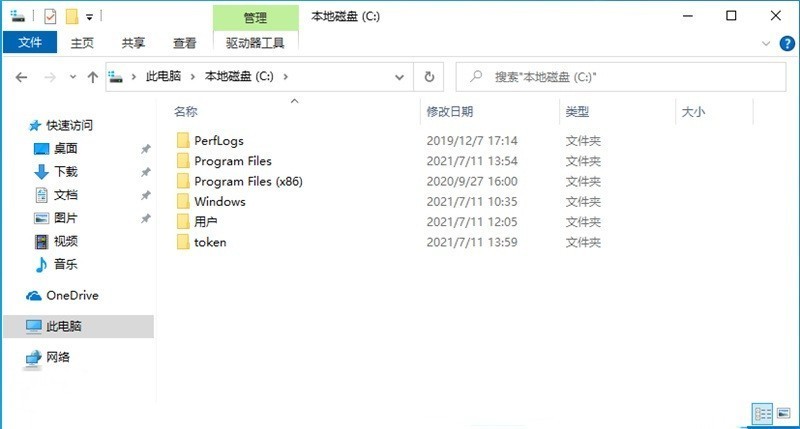
Next, we run Powershell as an administrator, and then enter (where C: token is the path to the folder we just created):
Save-Module - Name NtObjectManager -Path c:token
and press Enter (you will be asked when installing for the first time, enter [Y] and press Enter):
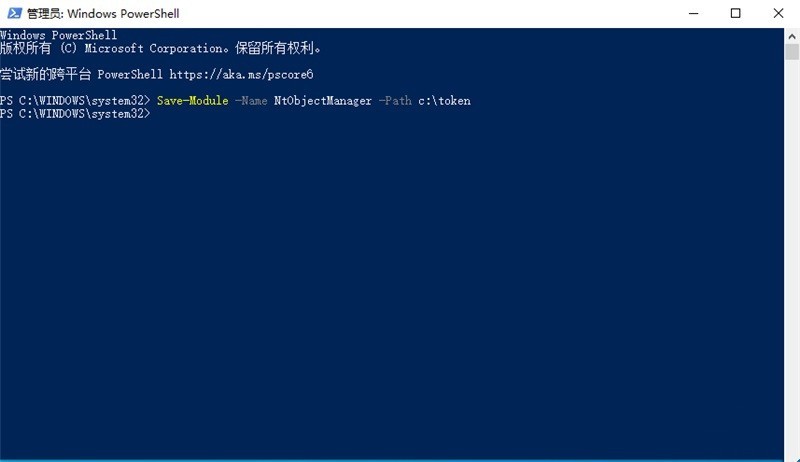
Wait a moment to download After completion, we enter:
Install-Module -Name NtObjectManager
and press Enter to officially install. If an untrusted repository appears, enter [A] and press Enter:
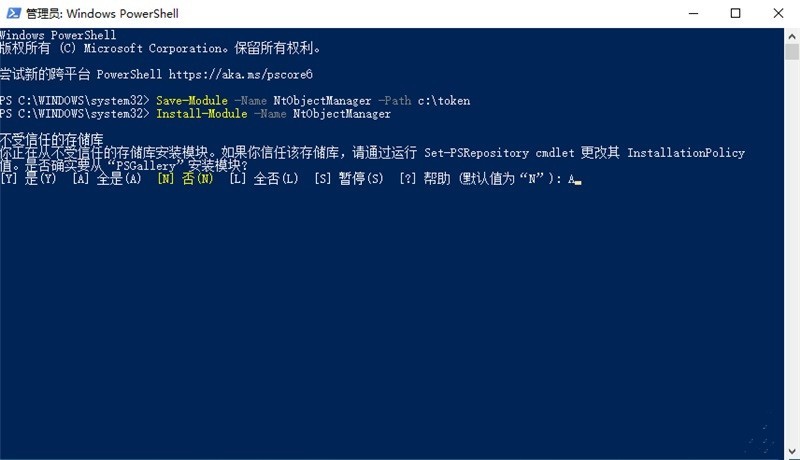
Wait a moment for the installation to complete. After that, we need to allow the system to allow the use of Powershell scripts. We enter:
Set-ExecutionPolicy Unrestricted
and press Enter. Then the system will display the execution policy change, we enter]A[ and press Enter to confirm:
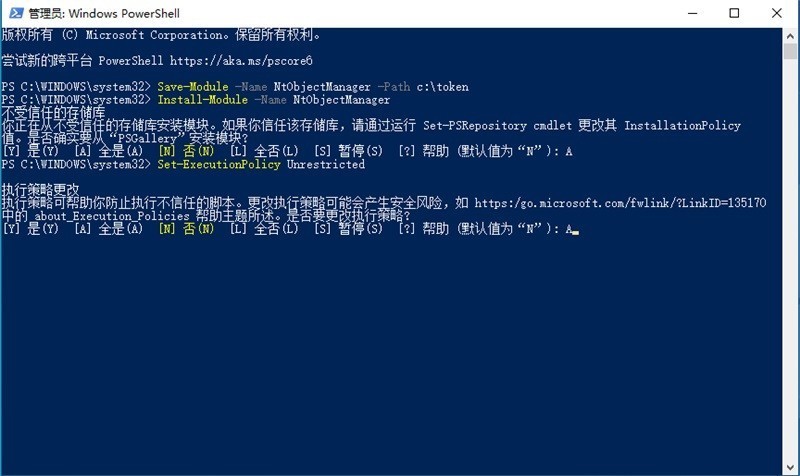
Next, we import the NtObjectManager module, we enter:
Import-Module NtObjectManager
and press Enter. At this point, our preliminary preparation work is over:
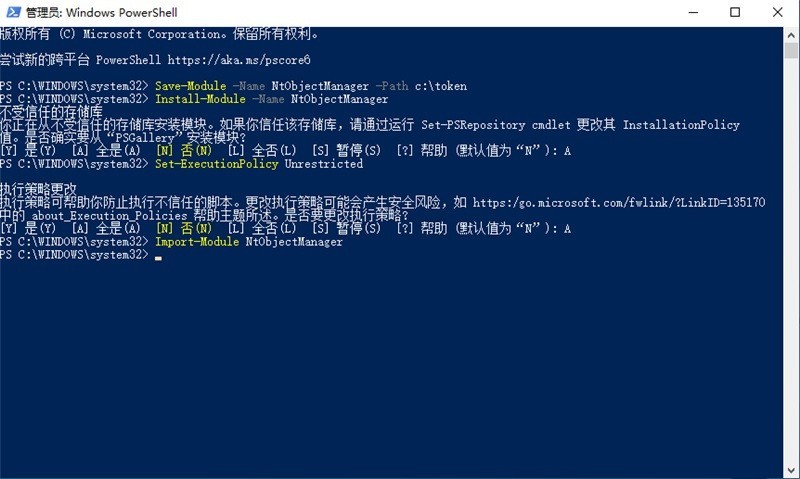
Officially begins
Now, we begin to officially obtain Trustedinstaller permissions. Enter in Powershell:
sc.exe start TrustedInstallerSet-NtTokenPrivilege SeDebugPrivilege$p = Get-NtProcess -Name TrustedInstaller.exe$proc = New-Win32Process cmd.exe -CreationFlags NewConsole -ParentProcess $p
and press Enter.
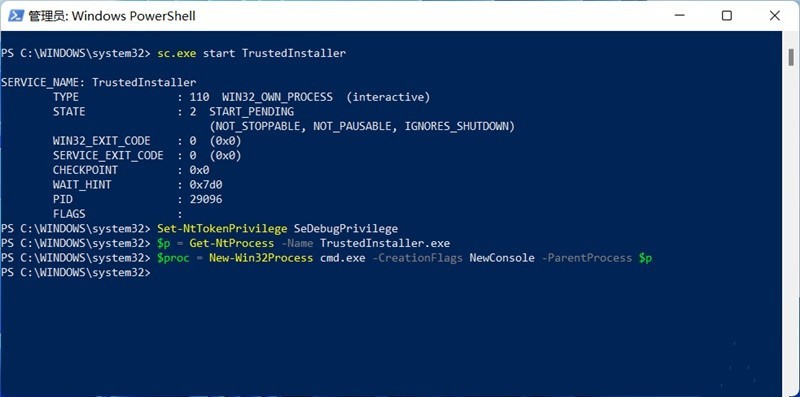
Next, the system will open a command prompt, which has Trustedinstaller permissions and can directly modify system files. We can test it through:
whoami /groups /fo list
:
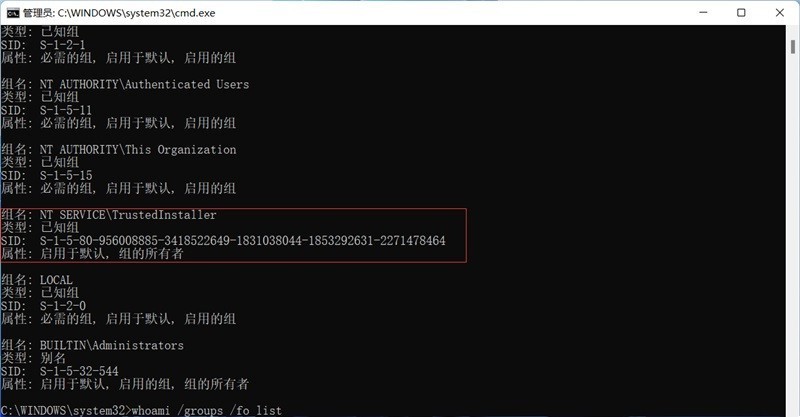
You can see that we have obtained Trustedinstaller permissions, now we can Modified system files through some commands. If you want to make the operation more convenient, you can run tasksmgr, notepad and other applications through this CMD, and edit files in the browsing window of running new tasks and opening files. Just close it after editing.
Notice! Do not use CMD to run explorer because explorer cannot be used normally under the current user. After this, if you want to regain Trustedinstaller permissions, re-execute the following command:
sc.exe start TrustedInstallerSet-NtTokenPrivilege SeDebugPrivilege$p = Get-NtProcess -Name TrustedInstaller.exe$proc = New-Win32Process cmd .exe -CreationFlags NewConsole -ParentProcess $p
The above is the detailed content of How to obtain Trustedinstaller permissions in Win11_How to obtain Trustedinstaller permissions in Win11. For more information, please follow other related articles on the PHP Chinese website!

Hot AI Tools

Undress AI Tool
Undress images for free

Undresser.AI Undress
AI-powered app for creating realistic nude photos

AI Clothes Remover
Online AI tool for removing clothes from photos.

Clothoff.io
AI clothes remover

Video Face Swap
Swap faces in any video effortlessly with our completely free AI face swap tool!

Hot Article

Hot Tools

Notepad++7.3.1
Easy-to-use and free code editor

SublimeText3 Chinese version
Chinese version, very easy to use

Zend Studio 13.0.1
Powerful PHP integrated development environment

Dreamweaver CS6
Visual web development tools

SublimeText3 Mac version
God-level code editing software (SublimeText3)

Hot Topics
 How to change the format of xml
Apr 03, 2025 am 08:42 AM
How to change the format of xml
Apr 03, 2025 am 08:42 AM
There are several ways to modify XML formats: manually editing with a text editor such as Notepad; automatically formatting with online or desktop XML formatting tools such as XMLbeautifier; define conversion rules using XML conversion tools such as XSLT; or parse and operate using programming languages ??such as Python. Be careful when modifying and back up the original files.
 How to format json in notepad
Apr 16, 2025 pm 07:48 PM
How to format json in notepad
Apr 16, 2025 pm 07:48 PM
Use the JSON Viewer plug-in in Notepad to easily format JSON files: Open a JSON file. Install and enable the JSON Viewer plug-in. Go to "Plugins" > "JSON Viewer" > "Format JSON". Customize indentation, branching, and sorting settings. Apply formatting to improve readability and understanding, thus simplifying processing and editing of JSON data.
 How to automatically type notepad
Apr 16, 2025 pm 08:06 PM
How to automatically type notepad
Apr 16, 2025 pm 08:06 PM
Notepad itself does not have automatic layout function. We can use a third-party text editor, such as Sublime Text, to perform the following steps to achieve automatic typography: 1. Install and open the text editor. 2. Open the file that needs to be automatically typed. 3. Find and select the automatic layout function. 4. The editor will automatically type the text. 5. You can customize the layout rules as needed. Automatic typography can save time and ensure text consistency and professionalism.
 How to run python with notepad
Apr 16, 2025 pm 07:33 PM
How to run python with notepad
Apr 16, 2025 pm 07:33 PM
Running Python code in Notepad requires the Python executable and NppExec plug-in to be installed. After installing Python and adding PATH to it, configure the command "python" and the parameter "{CURRENT_DIRECTORY}{FILE_NAME}" in the NppExec plug-in to run Python code in Notepad through the shortcut key "F6".
 How to run java code in notepad
Apr 16, 2025 pm 07:39 PM
How to run java code in notepad
Apr 16, 2025 pm 07:39 PM
Although Notepad cannot run Java code directly, it can be achieved by using other tools: using the command line compiler (javac) to generate a bytecode file (filename.class). Use the Java interpreter (java) to interpret bytecode, execute the code, and output the result.
 How to use notepad
Apr 16, 2025 pm 08:09 PM
How to use notepad
Apr 16, 2025 pm 08:09 PM
Notepad is a free text editor for Windows, which offers a variety of features such as: 1) syntax highlighting, 2) autocomplete, 3) macro recording, 4) plug-in extensions, 5) customizable interfaces and settings.
 How to return the previous version of win11 win11 system rollback operation guide
May 07, 2025 pm 04:21 PM
How to return the previous version of win11 win11 system rollback operation guide
May 07, 2025 pm 04:21 PM
Starting the rollback function on Windows 11 must be performed within 10 days after the upgrade. The steps are as follows: 1. Open "Settings", 2. Enter "System", 3. Find the "Recover" option, 4. Start rollback, 5. Confirm the rollback. After rollback, you need to pay attention to data backup, software compatibility and driver updates.
 How to make notepad into Chinese
Apr 16, 2025 pm 06:54 PM
How to make notepad into Chinese
Apr 16, 2025 pm 06:54 PM
Switching the Notepad interface to Chinese in Windows system only takes five steps: Open Notepad, select the "Format" menu, select "Font", set the language (Simplified Chinese or Traditional Chinese), close and re-open Notepad.





